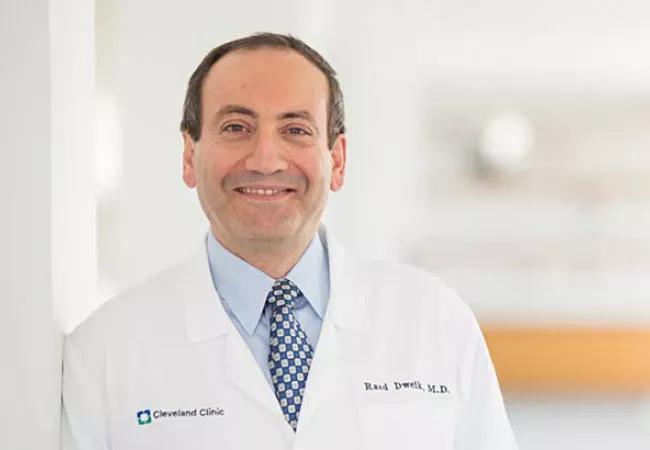Acclaimed clinician, researcher and educator

Cleveland Clinic has appointed Raed Dweik, MD, MBA, as Chairman of the Respiratory Institute. In his new role, Dr. Dweik will lead the more than 650 caregivers in Cleveland Clinic’s departments of Pulmonary Medicine, Critical Care Medicine, Infectious Disease, and Allergy & Clinical Immunology, as well as the institute’s clinical, research and educational efforts.
Advertisement
Cleveland Clinic is a non-profit academic medical center. Advertising on our site helps support our mission. We do not endorse non-Cleveland Clinic products or services. Policy
“I am as excited about assuming this role as I am humbled to follow in the footsteps of Herbert P. Wiedemann, MD, MBA, who masterfully led the institute for more than a decade,” says Dr. Dweik. “We are doing amazing things in respiratory medicine at Cleveland Clinic — mainly driven by the fact that we are highly subspecialized and have many high-functioning teams in all important disease areas.”
Dr. Dweik served as the institute’s Interim Chair since March 2018, when Dr. Wiedemann was appointed Cleveland Clinic’s Chief of Staff.
Overview: Joined Cleveland Clinic in 1996. Chair of Innovation Management and Conflict of Interest office since 2014. Director of Pulmonary Vascular Program since 2005; credited with transforming it from a two-physician program to one of the largest programs in the nation. Professor of Medicine, Cleveland Clinic Lerner College of Medicine. Joint appointment in Cleveland Clinic’s Lerner Research Institute. Continuous funding from National Institutes of Health (NIH) since 2002. Acclaimed for pioneering work in exhaled breath analysis in lung and systemic disease. More than 250 peer-reviewed manuscripts and book chapters.
Education: MD, University of Jordan, 1988; residency in internal medicine, Wright State University, 1993; fellowship in pulmonary and critical care medicine, Cleveland Clinic, 1996; MBA, Case Western Reserve University, 2017
Clinical interests: pulmonary disease, pulmonary hypertension, asthma, chronic beryllium disease, critical care
Advertisement
Advertisement

Advanced software streamlines charting, supports deeper patient connections

How holding simulations in clinical settings can improve workflow and identify latent operational threats

Interactive Zen Quest experience helps promote relaxing behaviors

Cleveland Clinic and IBM leaders share insights, concerns, optimism about impacts

Cleveland Clinic partners with Palantir to create logistical command center

A Q&A with organizational development researcher Gina Thoebes

Cleveland Clinic transformation leader led development of benchmarking tool with NAHQ

Raed Dweik, MD, on change management and the importance of communication